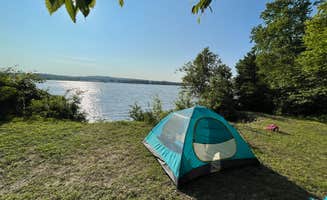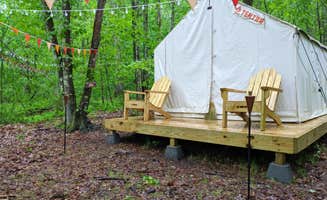Primitive tent campers near Groton, Connecticut can find secluded river and island sites along the Connecticut River, most requiring boat or kayak access. The camping terrain varies from riverside beaches to wooded island settings, with sites typically situated 20-35 feet above the water level. Weather conditions can change rapidly in this region, with summer morning fog common along the river corridor, occasionally delaying water departures.
What to do
Water exploration: Chapman Pond Preserve offers proximity to the Connecticut River with established tent platforms. "Good tent platforms, picnic tables and outhouse. CT river within view. Good site," notes Ben L., who appreciated the balance of amenities and natural setting.
Wildlife observation: Early mornings at river sites provide opportunities to spot osprey, bald eagles, and great blue herons. At River Highlands State Park River Campground, campers can experience riverside wildlife from their sites. "The campsite was absolutely beautiful—especially with its location right by the river," reports Alicia B., though she cautions about the presence of "wolf spiders in the outhouse."
Historical tours: Several tent camping areas provide water access to historical sites, including historic riverboat landmarks and colonial-era structures. Schedule 2-3 hours for these self-guided explorations, as river current can affect return times to campsites.
What campers like
Riverfront privacy: Many tent sites along the Connecticut River corridor offer substantial separation between camping groups, with natural vegetation providing screening. "We have camped on the south end of Hurd Park several times via boat access. It is amazing with the views of the CT River and being able to watch the sunrise and sunset," shares Jackie G. about Gillette Castle State Park Campground.
Tidal beach access: The 3-foot tidal range on the Connecticut River creates temporary beaches for daytime use. Low tide typically occurs twice daily, exposing sandy areas for approximately 2-3 hours each cycle.
Fog-shrouded mornings: The mist rising off the Connecticut River creates distinctive camping experiences in spring and fall. Water temperature differences with the air can create dense fog layers up to 15 feet thick, typically burning off by mid-morning.
What you should know
Water transportation planning: Accessing island camping requires watercraft and proper packing techniques. Selden Neck State Park Campground is accessible only by boat. A camper with their 5-year-old reported: "It's about a 20 minute paddle across the river to the island. If it's a nice day, you're going to encounter some wake from passing boats so make sure your gear is in waterproof bags."
Limited facilities: Most tent sites near Groton require campers to be self-sufficient with water, waste management, and supplies. Only Hidden Lake Farm provides drinking water, showers and toilet facilities among the primitive options. "Quiet and Private," notes Ashley F. about the site's secluded atmosphere.
Seasonal variations: Spring camping (April-May) often encounters higher water levels and cooler nights, while summer brings increased boat traffic on weekends. Fall camping provides the most solitude but requires additional cold-weather gear as temperatures can drop into the 40s overnight.
Tips for camping with families
Site selection: Choose campsites with natural boundaries for child safety, particularly when camping near water. Sites located at least 30 feet from shorelines provide better supervision margins.
Preparation for weather shifts: Pack additional layers for children as river valley temperatures can drop 10-15°F after sunset, even in summer months.
Accessibility considerations: For families with young children, consider the difficulty of water access points. Frosty Hollow Camping Area offers drive-in tent sites more suitable for families with small children, eliminating the challenges of boat transportation.
Tips from RVers
Alternative accommodations: While most primitive tent camping near Groton requires boat access or walking, RVers can find limited tent options with vehicle access points within a 30-minute drive.
Drop-off logistics: RVers base-camping at developed campgrounds can coordinate kayak shuttles to primitive tent sites, using RVs as secure gear storage while tent camping on islands or remote locations.
Seasonal considerations: The best tent camping near Groton, Connecticut for RVers occurs from late May through early October when river conditions and temperatures are most predictable for combined RV-tent camping adventures.



